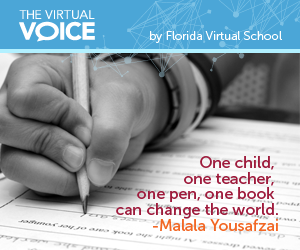Social Media, Malala, and Changing the World
 If you haven’t read her book, you probably saw her in your Facebook feed. You may have even watched her capture the attention of the United Nations as she advocated for peace after being shot in the head. If not, possibly you watched Jon Stewart interview her on the “Daily Show” where she talked about her appreciation for education because of the way the Taliban “blasted schools” and “snatched education” from Pakistani children. When you read her book, I Am Malala: The Girl Who Stood Up for Education and Was Shot by the Taliban, you read of a girl who fervently loves school. As a teacher, there are few things more heartwarming. Along with her story of compassion and forgiveness comes a tremendous responsibility for educators.
If you haven’t read her book, you probably saw her in your Facebook feed. You may have even watched her capture the attention of the United Nations as she advocated for peace after being shot in the head. If not, possibly you watched Jon Stewart interview her on the “Daily Show” where she talked about her appreciation for education because of the way the Taliban “blasted schools” and “snatched education” from Pakistani children. When you read her book, I Am Malala: The Girl Who Stood Up for Education and Was Shot by the Taliban, you read of a girl who fervently loves school. As a teacher, there are few things more heartwarming. Along with her story of compassion and forgiveness comes a tremendous responsibility for educators.
I am captivated as I read her book, both by the story and the storytelling. I hope someday to have the eloquence and tenacity of this teenager. At just 16 years old, Malala was nominated for the Nobel peace prize.
I think that I am most humbled, however, by the awesome responsibility I feel as an educator. Her insight is powerful and demands reflection: “One child, one teacher, one pen, one book can change the world,” she tells us. Malala is talking to me and you. We are world changers. You can be the teacher to change the world…and you can teach the student who changes the world.
Each day I speak to my Social Media students about their passion projects; we talk about how they can use their voice to create positive social change. At FLVS, we have talent and passion beyond what you might imagine. Our students – and all kids, really – care about social issues and want to make a difference in the world and in their community. “Issues” are relative, and we are blessed beyond measure not to have the concerns that Malala and many oppressed women in many parts of the world do, but our students do have their own issues and concerns. They want to stop bullying, promote kindness, and create safe havens for victimized kids. They want to promote pet adoption, have canned food drives, and work toward creating equality for various communities. Anyone who ever thought that teenagers are apathetic has not met students in our Social Media course. The truth is, our kids care much more than we often give them credit for.
Passion projects vary greatly in scope and detail, but each one has a common denominator: all projects represent the personal commitment of the student to make his or her corner of the world a better place. Whether that is through promoting animal adoption over puppy mills because of a passion for pets, or promoting healthy eating habits instead of fast food because of a passion for health and fitness, we are creating a culture of activism among our students. Malala’s story is grounding; it reminds me of the many things that are easy to take for granted as a privileged American: safety, relative peace, prosperity, and education. While we are reminded of our position of fortune, she forces us to consider the associated responsibility. She says, “Some people only ask others to do something. I believe…why don’t I take a step and move forward.” I swell with pride when I consider that at FLVS we are promoting this sense of activism and social responsibility.
What is your passion project?
Resources
I Am Malala: The Girl Who Stood Up for Education and Was Shot by the Taliban,
http://www.amazon.com/Malala-Story-Stood-Education-Taliban-ebook/dp/B00CH3DBNQ

 Darcey Addo is a National Board Certified teacher who has been teaching at FLVS since 2009. She has a Master’s degree in Teacher Leadership and Urban Education and is currently pursuing a PhD in Leadership, Policy and Change in Education. Darcey is an Examiner for the Florida Sterling Council and has a keen interest in process and performance improvement. In her local community, she serves as an adult member of the Youth Advisory Board to the Mayor, helping students get involved in local government and community activism.
Darcey Addo is a National Board Certified teacher who has been teaching at FLVS since 2009. She has a Master’s degree in Teacher Leadership and Urban Education and is currently pursuing a PhD in Leadership, Policy and Change in Education. Darcey is an Examiner for the Florida Sterling Council and has a keen interest in process and performance improvement. In her local community, she serves as an adult member of the Youth Advisory Board to the Mayor, helping students get involved in local government and community activism.